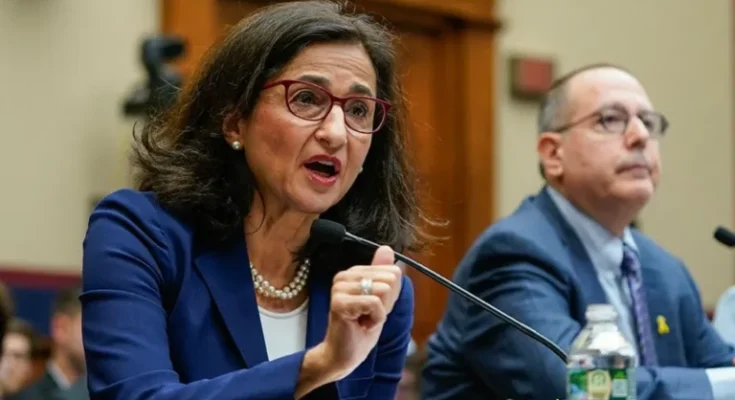Columbia University President Minouche Shafik has resigned from her position, just four months after the university was shaken by campus protests over the war in Gaza. Dr. Shafik’s resignation comes a year after she assumed the role at the prestigious Ivy League institution in New York City, and just weeks before the start of the autumn semester.
Dr. Shafik is now the third Ivy League president to step down due to their handling of Gaza war protests. Back in April, she authorized the New York Police Department to intervene on campus, a decision that led to the arrest of approximately 100 students who were occupying a university building. This incident marked the first mass arrests at Columbia since the Vietnam War protests over 50 years ago and sparked further protests at colleges across the United States and Canada.
In an email to students and faculty on Wednesday, Dr. Shafik reflected on the period of unrest, noting it had been difficult to reconcile the divergent views within the community. She acknowledged the toll it had taken on her family and others within the university. Dr. Shafik stated that after much reflection over the summer, she decided stepping down was the best course of action for Columbia as it faces future challenges. She expressed distress over the threats and abuse directed at her, her colleagues, and students.
Katrina Armstrong, CEO of the Columbia University Irving Medical Center, will serve as interim president. The university’s board of trustees praised Dr. Shafik for her contributions during a challenging time, expressing disappointment at her departure but understanding her decision.
The protests against Israel’s actions in the Gaza conflict have posed difficult questions for university leaders nationwide, with campuses becoming focal points for demonstrations since the outbreak of hostilities on October 7. Dr. Shafik’s resignation follows those of the Harvard and University of Pennsylvania presidents, who also faced backlash over their handling of campus protests and congressional testimony regarding antisemitism and hate speech.
“Jewish students were excluded from portions of the UCLA campus because they refused to denounce their faith,” Judge Scarsi wrote in his order, calling the situation “unimaginable and abhorrent to our constitutional guarantee of religious freedom.” UCLA blamed outside agitators for the checkpoints and has expressed opposition to the ruling.
The protests and unrest follow the Hamas-led attack on Israel on October 7, which resulted in the deaths of approximately 1,200 people and the taking of 251 hostages back to Gaza. This attack led to a large-scale Israeli military offensive against Gaza, where the Hamas-run health ministry reports that at least 39,897 Palestinians have been killed in the ongoing conflict.



